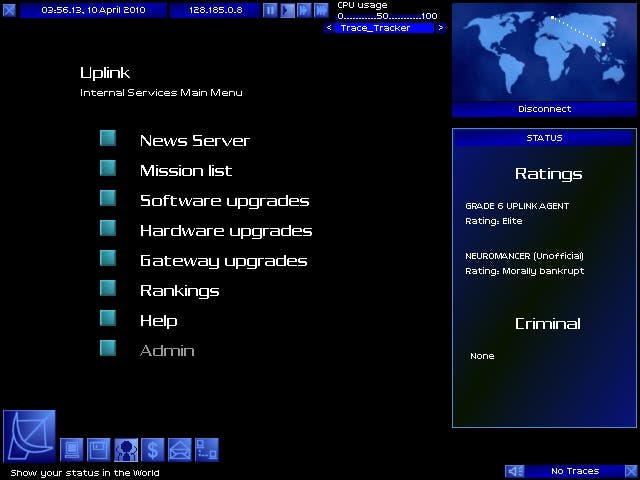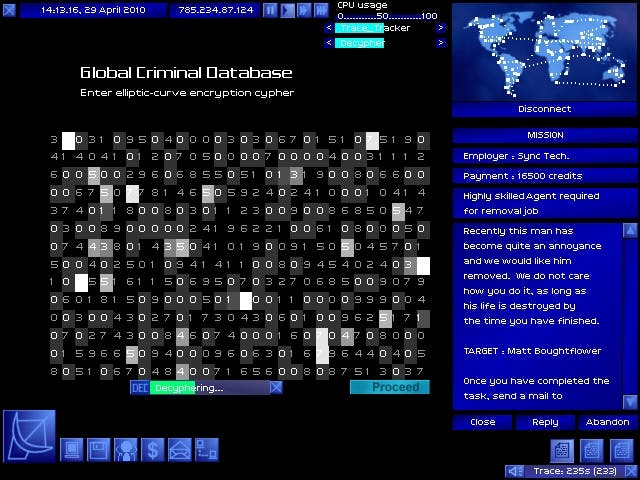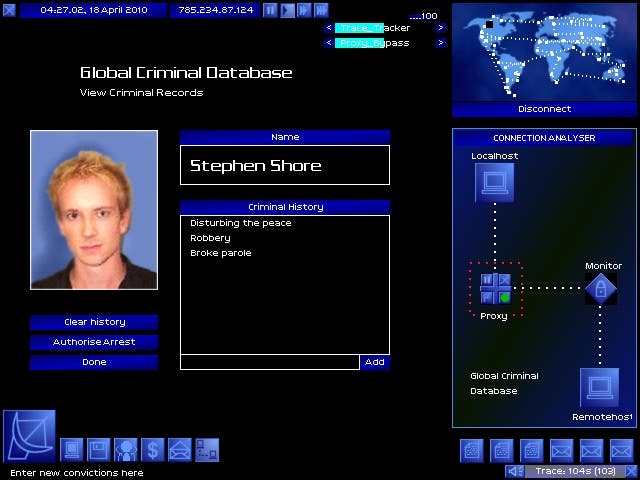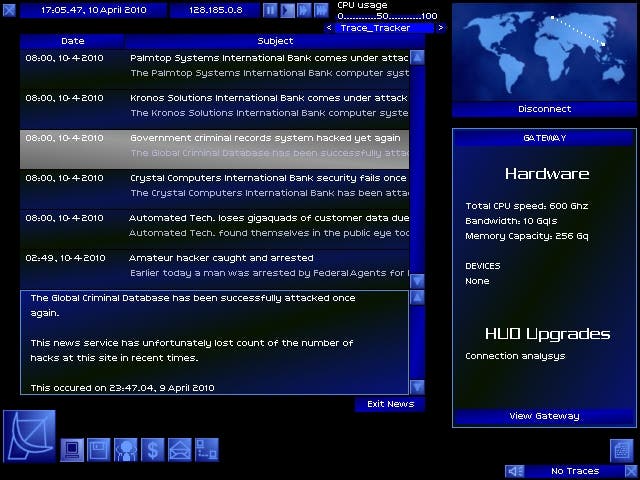Uplink
Review - the world's first hacking sim?

Uplink Established
Back in the 1980s you couldn't consider yourself a true geek unless you had programmed an entire game from your own back bedroom, preferably in assembly code. While game development has moved on somewhat since the Dark Ages, every now and then a new company pops up from the proverbial back bedroom and delivers the kind of innovative genre-defying game that a big international publisher wouldn't have touched with a barge pole. Enter Uplink, produced on a shoestring budget by a tiny British team called Introversion.
Set a few years in the future, Uplink casts you as a freelance computer hacker, carrying out a variety of legally dubious jobs ranging from the simple to the incredibly complex and time consuming. One minute you could be breaking into a software company's file server to steal data, the next trying to frame someone for bank fraud, cripple a company with a virus attack or track down a rival hacker.
Jobs are usually gained via the Uplink Internal Services server, a kind of high tech BBS where potential clients can meet and hire unscrupulous hackers such as yourself. You can also use the server to browse through the latest news reports, buy new software and hardware upgrades and get helpful pointers on security systems and basic hacking techniques from the help menu.

That'll Be The Bounce
Any good hack begins with a bounce. If you simply connect to a server directly and start messing around with files you will be traced almost instantly, which can lead to a fine or (in extreme cases) a spell in jail and the loss of your Uplink account. In other words, game over.
To give your target's trace program something to think about, you can first bounce your signal off other servers by clicking on them on the world map. Once you're satisfied that you have enough servers in your chain, simply finish the route with the target server and then click connect. Assuming you bought a trace tracker and have it running, you will know as soon as your target has spotted your intrusion, and the beeping of the tracker as the trace homes in on your gateway computer at Uplink helps build up an amazing amount of tension.
The downside to this system is that there are literally dozens of servers in the game, and there's nothing to stop you bouncing your signal off all of them, except for the possible onset of boredom from the amount of clicking involved. With a little patience you can set up a route that will give you a couple of minutes or more to hack even the most secure of servers, and however many times your signal gets bounced around the world, you never experience any lag. If only the real internet worked like that. The world map can also get rather messy if you have a lot of servers displayed at once. Text labels can overlap, and if your connection is being bounced off servers which you don't currently have listed on the map screen, the labels of those that are visible will dance around in confusion.

Breaking The Bank
Unfortunately this isn't an isolated problem, and the game has a lot of rough edges. The various HUD elements don't overdraw each other properly, for example, which can leave bits of a background window poking out from underneath the active one, and the game also includes an impressive array of typos, misspellings and grammatical errors.
Despite these presentation problems and gameplay niggles though, Uplink is still surprisingly involving. The graphics are spartan but stylish, the sound likewise, and there's something strangely satisfying about reading a news report that a suspected hacker has been arrested, when in fact the man is completely innocent and is only being picked up by the police because you hacked into the Global Criminal Database a few hours earlier and edited his criminal record.
The randomly generated missions are varied enough to keep you busy for a few hours at least, and as your Uplink agent rating rises with each successful mission you're offered ever more interesting and dangerous jobs, with new possibilities opening up all the time. If you get bored of carrying out preset missions you can trade on the stock market or break into bank servers to transfer other people's money into your own account, and there are some nice easter eggs hidden away, such as a Protovision game server ("how about a nice game of chess?"). Then, just as the novelty starts to wear off, the storyline kicks in. Suddenly you have several unique special missions to carry out for one or both sides in a battle between rival corporations that involves a mysterious piece of software and the death of one of Uplink's top hackers.

My Voice Is My Passport
Actually hacking into a server is a fairly mechanical procedure, with the player first cracking any passwords and other security checks, then bypassing or disabling proxies and firewalls, before finally editing, deleting or copying the relevant data. Once you are finished you can modify or delete the server logs to mask your incursion or, if time is short, disconnect and then hack into one of the servers you bounced your signal through, destroying its logs to break the chain between you and the target server.
Although you follow much the same process for every server you hack into, it can still be a highly entertaining and rewarding experience. There are enough variations in security systems, hacking techniques and mission objectives to stop things from getting too repetitive, and the sheer tension (particularly if you manage to resist the temptation to bounce your signal off a hundred other servers) is incredible.
As you earn money from completing missions, new software can be bought to analyse and bypass server defences, break cyphers and passwords, decrypt downloaded data, and analyse speech to get past voice print checks. All of which gives you access to a wider range of servers and jobs. Faster or more numerous processors can be bought to speed up the rate at which this software is run, additional memory gives you more storage space for stolen data and programs, and faster modems increase transfer rates. You can even install a self-destruct device on your gateway computer that will blow up the machine if somebody tries to tamper with it, which could save you from being jailed.
Conclusion
Uplink is an innovative and addictive game, a triumph for bedroom game development. Sadly graphical glitches, a slightly awkward interface and the rather simplistic server bouncing system lets it down somewhat, but it's still well worth a look if you fancy something completely different.








